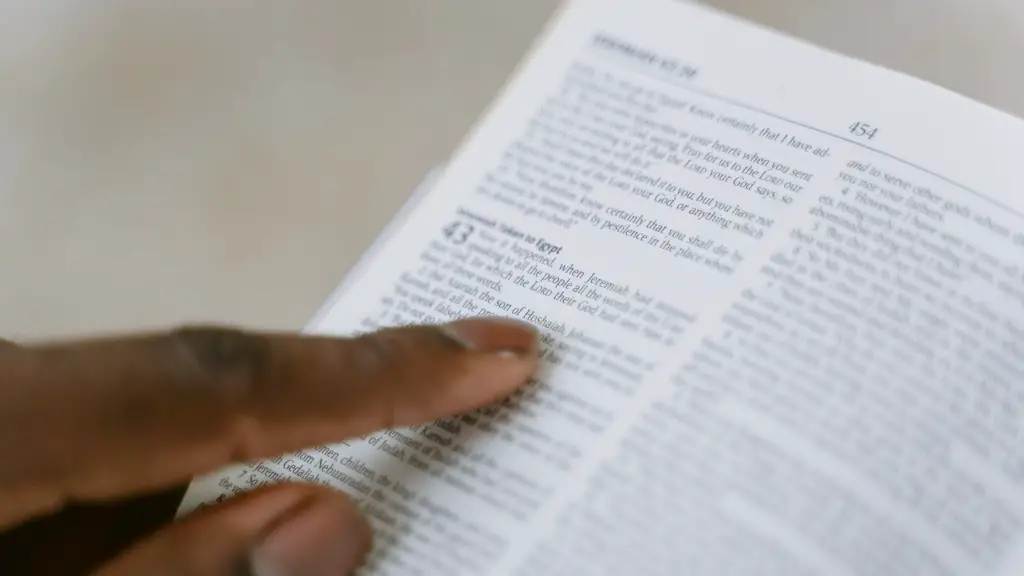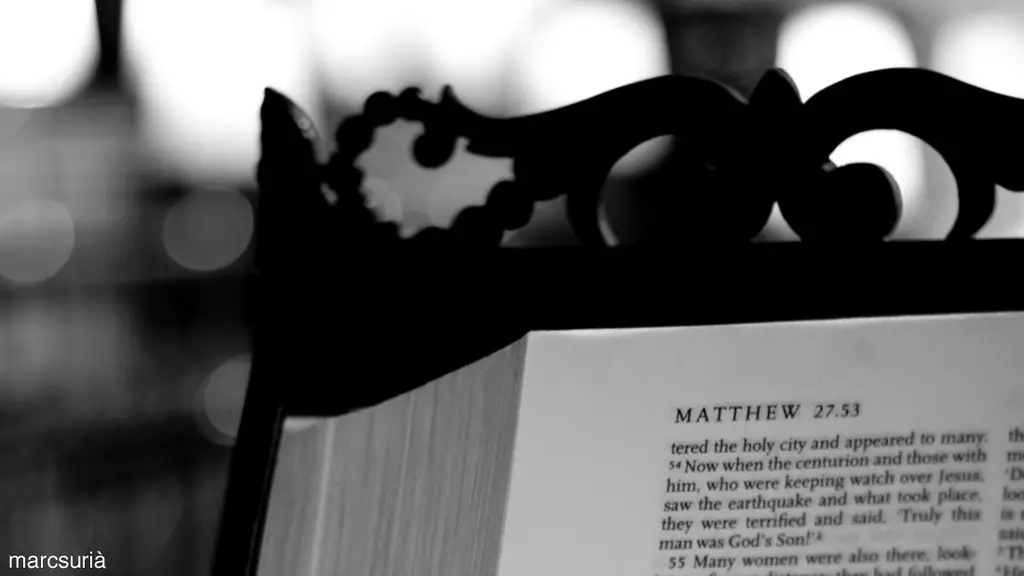The debate as to when life should be considered to begin has always been a contentious one. Biblical scriptures are often referenced when people engage in this debate, but their interpretation is subjective and opinions and beliefs can vary wildly. When contention arises with regards to the beginning of life, one fundamental question that is often asked is, ‘Does the Bible say that life starts at first breath?’.
When reading the Bible, some passages do appear to support the notion that life begins at first breath. For example, Genesis 2:7 says, “Then the Lord God formed a man from the dust of the ground and breathed into his nostrils the breath of life, and the man became a living being.” Such passages suggest that once someone is infused with breath, they become alive.
However, other Biblical passages suggest that life begins much earlier than first breath. For example, Job 33: 4 says “The Spirit of God has made me; the breath of the Almighty gives me life.” This passage suggests that even before a baby is born, the breath of God endows them with life.
Further still, Psalm 139: 13-16 states, “you knit me together in my mother’s womb”. This passage suggests the baby is already alive before it has had its first breath. It is doubtful whether a foetus could be considered alive before it takes its first breath, if not from a scientific perspective, then certainly from a spiritual one, and many religious people would adopt this view.
The Bible’s discussion on when life starts is also emotionally charged. Jeremiah 1:5 notes “Before I formed you in the womb I knew you, before you were born I set you apart”. This sentiment of life being evident even before birth suggests that it starts earlier than first breath.
With such passages, it is not clear cut as to what the Bible suggests with regards to life beginning at first breath. Ultimately, interpretation of it is tied with individual beliefs and opinions. As such, when the Bible is referenced in relation to the beginning of life, it must be done in an informed and well-rounded manner, as to not adhere to one school of thought over another.
What Science Says
In contrast to the Bible, science provides more of a definitive answer with regards to the point of conception for life. Medical science has long declared that the beginning of a baby’s life is at conception, with the fusion of the sperm and egg. However, the debate continues to rage with regards to when life should legally begin, and accounts for an interesting yet important scientific discussion.
Often reinforcing the medical science viewpoint on when life begins is its ability to identify key indicators of life. Medical technology has advanced greatly in recent decades, allowing doctors to incorporate prenatal screenings of potential medical issues during pregnancy. This suggests that the fetus is alive before it has even taken its first breath, indicating that a baby not only has to be born alive, but begin their life long before they experience their first breath.
Further to this is the fact that medical science has enabled the continuation of life in cases where a premature baby can survive outside of the womb, or with artificial breathing apparatus. This suggests that there may be various points of life’s inception and does not necessarily rely on just breath.
While the advancements of medical science continue to enable more of a concrete understanding of when life begins, there still exists conflicting views amongst scientists. For example, many believe that the concept of ‘personhood’, or a determination of what constitutes a living human, is a complex subject that cannot be looked at just from a medical context.
Ultimately, how the Bible and the advancements of medical science intersect with regards to when life begins at first breath will depend on individual interpretation and beliefs.
The Impact of Religion
Religion and its presence in the debate surrounding when life begins has long been a hotly contested point. For example, in the Old Testament of the Bible, Leviticus 20:2 states “then I will set my face against that man and against his clan and will cut them off from among their people, him and all who follow him, going after Molech”. The significance of this passage relates to Molech being a god who it was believed sacrificed babies and children. As such, this suggests that a child had to have been alive in order to be sacrificed, further indicating the fact that life was seen to have begun before first breath.
When looked at from the Christian perspective, the Bible is often used to provide guidance when it comes to the moral question of when life begins. Some believe that the breath of God provides an essence to life, while others honour individual interpretation, taking personal beliefs and feelings into account. From this perspective, the Bible can provide guidance to those who seek it.
However, some faith leaders, particularly in recent decades, have been highly critical of the Bible and its additional layer of consultation when it comes to the beginning of life. While some faith leaders may use the Bible to back up personal beliefs, others are far more liberal in understanding of when life should legally begin and reject the Bible’s moral influence on the debate.
The intersection between religion and when life begins has thus created a complex understanding, motivating many people to continue to search for a conclusive answer to this unanswerable question.
The Political Sphere
The political institution of many nations has unsurprisingly been heavily involved in the debate going on with regards to when life begins. For example, in the United States, the passing of the Heartbeat Bill in Ohio in 2011 signified a big shift in opinion in US politics with regards to when life should be considered to have begun. This bill prohibited abortions in all circumstances after the detection of a heartbeat, with the belief that a fetal heartbeat was indicative of life.
In other parts of the world, many countries have adopted a more relaxed approach with regards to the beginning of life, with some relying more heavily on the sciences and the medical community, rather than the religious scripture of the Bible for guidance.
Regardless of the various political standpoints, when it comes to the debate surrounding when life begins, the Bible, medical science and varying beliefs on the matter all offer answers and frameworks for guidance. Ultimately, which of these will be adhered to depends on the personal beliefs of the individual and the discretion of law-makers and leaders in society.
Impartiality
When it comes to the question of when life begins, it is important to remember to remain impartial when discussing the different perspectives and input into the debate. In a world of differing beliefs and complex moral issues, the perspectives of all parties must be heard and respected.
Regardless of whether life begins at first breath or before, when discussing the matter it is important to remember to remain politically neutral and respectful. It is also important to consider the emotional and ethical nature of the issue and to empathise with the feelings of those affected.
It is paramount to not jump to conclusions when seeking the truth behind when life begins at first breath, as definitively answering such a complex question is important for all those involved.
The Complex Nature of Life
Ultimately, does life starts at first breath? The Bible does not provide a concrete answer to this question, with many different interpretations of the scripture existing across the world. Medical science appears to point to a more definite answer, indicating that life begins at conception. However, the intersection between religion and when life begins has been heavily debated and remains a complex matter to answer unequivocally.
With the debates and discussions going on regarding when life begins, or when life legally begins according to law, it is important to keep in mind the impartiality required to understand such a complex moral issue. It is clear to understand that as much as science can infer and provide evidence of when life begins, concrete conclusions remain hard to reach when it comes to this intricate subject matter.





